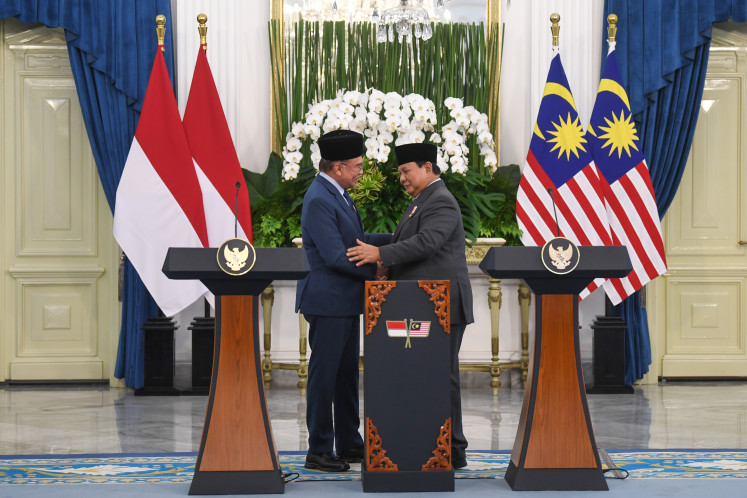Popular Reads
Top Results
Can't find what you're looking for?
View all search resultsPopular Reads
Top Results
Can't find what you're looking for?
View all search resultsGovt to cover 96 million people under BPJS
Once the universal health coverage takes effect in the early of 2014, the program is expected to cover 96 million Indonesians categorized as poor residents, a senior health official says
Change text size
Gift Premium Articles
to Anyone

O
nce the universal health coverage takes effect in the early of 2014, the program is expected to cover 96 million Indonesians categorized as poor residents, a senior health official says.
Deputy Health Minister Ali Ghufron Mukti said over the weekend that at least 96 million people, or 40 percent of the country’s poor population, would be eligible for the program.
“It could even increase to up to 117 million people,” he said.
Others, however, still have to pay premium coverage under the plan.
Data from the ministry said that 63.18 percent of the population are already covered by various social protection programs. The government-funded Jamkesmas community health protection plan covered 76.4 million people, making it one protection approach with the widest possible coverage. Insurance company PT Askes provides a health protection program for 16.4 million civil servants, while other plans take the form of local administration-funded Jamkesda community health coverage and other programs run by PT Jamsostek and private insurance.
“We aim to expand the health coverage by 2014, as 88 million people, or 37 percent, which include nonpoor informal workers and formal workers, remain uninsured,” said Ghufron. The number of uninsured formal workers is currently estimated to be around 60 million.
The Health Ministry’s head of community healthcare financing, Usman Sumantri, said that under the Social Security Providers (BPJS) plan, everyone must pay a premium.
“No healthcare services are given for free. We are devising mechanisms on how best to collect the premium paid by the people. Premiums for the poor, however, are to be paid by the government,” he said.
He said the government is drawing up regulation that would provide details on who would be eligible for the program and how much of the premium they should pay.
Under the BPJS, the government expects better management for health coverage, as the outfit would serve as the sole institution with authority to deliver health coverage for Indonesian people.
Existing social coverage providers, such as Jamkesmas, Jamkesda, and PT Askes, will merge once the BPJS Law takes effect in 2014.
The government is allocating Rp 700 billion (US$76.3 million) to improve the health service system ahead of the implementation of BPJS, such as increasing the number of beds and skilled health workers, as well as developing more community health centers with in-patient facilities.
World Health Organization (WHO) regulation stipulates that the proportion of “third-class” beds should come in the ratio of 1:1,000.
“We now only have 114,000 beds, both in public and private hospitals. With a population of 237 million, we need at least 237,000 beds. So, we need 123,000 more beds,” Ghufron said.
The Health Ministry is also training health workers, including doctors, specialist doctors and nurses, so that they could provide quality healthcare once the BPJS is in place.
The government expects that with 72 medical schools in the country, they could produce at least 5,000 doctors.









